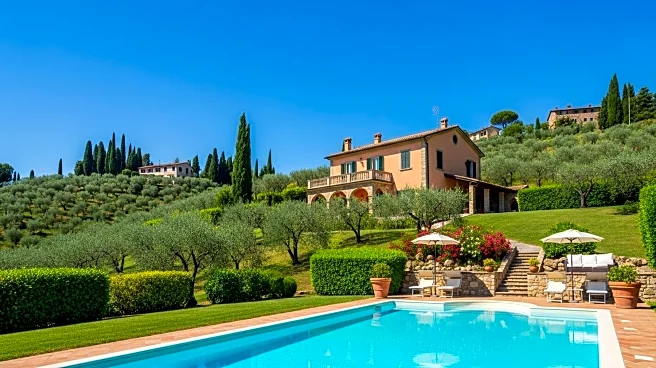What's Happening?
Italy's hospitality sector experienced significant growth in the first half of 2025, with Revenue Per Available Room (RevPAR) increasing by 3% year-over-year. This growth was driven by a 2% increase in Average Daily Rate (ADR) and a 1% rise in occupancy rates. Rome and Milan were standout performers, with Rome's RevPAR growing by 3% and Milan seeing a 5% increase, supported by both occupancy and ADR improvements. The sector's positive outlook for the second half of the year is bolstered by peak summer demand and enhanced air connectivity, particularly in southern and coastal areas. The Italian hotel investment market also saw robust activity, with transactions reaching nearly €1.7 billion, a 102% increase compared to the previous year. Rome and Venice led this investment activity, generating over €780 million, which accounts for 47% of the national volume.
Why It's Important?
The growth in Italy's hospitality sector is significant for several reasons. It indicates a strong recovery and normalization post-pandemic, reflecting increased international visitor spending and a thriving meetings and events industry. The substantial investment in the hotel market, particularly in luxury and upscale segments, underscores investor confidence and the strategic appeal of cities like Rome and Venice. This growth contributes positively to Italy's economy, with the travel and tourism sector having contributed $248.3 billion to the country's GDP in 2024. The increased demand and investment are likely to drive further economic activity, benefiting local businesses and employment in the hospitality and tourism sectors.
What's Next?
Looking ahead, the hospitality sector in Italy is expected to continue its positive trajectory in the second half of 2025. The peak summer season and improved air connectivity are likely to sustain demand. Additionally, the strong deal pipeline and sustained foreign interest suggest continued momentum in hotel investments. Prime yields are expected to experience further compression due to resilient demand and limited supply of core products. The sector's growth may also encourage more hotel openings and expansions, particularly in key cities and coastal areas, further enhancing Italy's appeal as a top tourist destination.
Beyond the Headlines
The robust growth in Italy's hospitality sector may have broader implications for the country's economic and cultural landscape. The increased focus on luxury and upscale hotel segments could attract a higher-end clientele, potentially influencing local businesses and cultural offerings to cater to this demographic. Additionally, the strong international investment presence highlights Italy's global appeal and may encourage further cross-border collaborations and partnerships in the tourism and hospitality industries.










